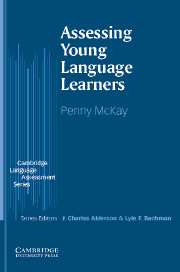Book contents
- Frontmatter
- Contents
- Series editors' preface
- Acknowledgments
- 1 A special case for young learner language assessment
- 2 Young learners and language learning
- 3 Research into the assessment of young language learners
- 4 Assessing language use through tasks
- 5 Classroom assessment of language use
- 6 Assessing oral language
- 7 Assessing reading and writing
- 8 Evaluating young learners' performance and progress
- 9 Testing young language learners through large-scale tests
- 10 The way forward
- References
- Index
- Publishers' acknowledgments
7 - Assessing reading and writing
Published online by Cambridge University Press: 04 May 2010
- Frontmatter
- Contents
- Series editors' preface
- Acknowledgments
- 1 A special case for young learner language assessment
- 2 Young learners and language learning
- 3 Research into the assessment of young language learners
- 4 Assessing language use through tasks
- 5 Classroom assessment of language use
- 6 Assessing oral language
- 7 Assessing reading and writing
- 8 Evaluating young learners' performance and progress
- 9 Testing young language learners through large-scale tests
- 10 The way forward
- References
- Index
- Publishers' acknowledgments
Summary
Introduction
In this chapter we turn to the assessment of the abilities of young learners to read and write in their foreign or second language. To many, assessment of reading and writing is more pressing than the assessment of oral language: this may be because these skills are more readily associated with learning and academic progress by parents and administrators, or because they are more likely (often because of testing costs) to feature prominently in high-stakes external tests. Yet, as was emphasized in the previous chapter, oral language is the foundation for reading and writing, and to promote reading and writing assessment over oral language assessment ‘because it is important’ or ‘because it is less expensive’ is to do the young language learner a disservice. Even though writing can support oral language development to some extent, the more oral language that children can bring to their reading and writing assessment tasks, the more successful and motivated they will be. This is just one area of knowledge that teachers and assessors bring to the assessment of young learners' reading and writing; they also require a range of professional understandings about the expected developmental progress, the influence of first language literacy abilities, and the role of the cultural and background knowledge in reading and writing in a foreign or second language. These are briefly summarized at the beginning of this chapter.
- Type
- Chapter
- Information
- Assessing Young Language Learners , pp. 217 - 263Publisher: Cambridge University PressPrint publication year: 2005



